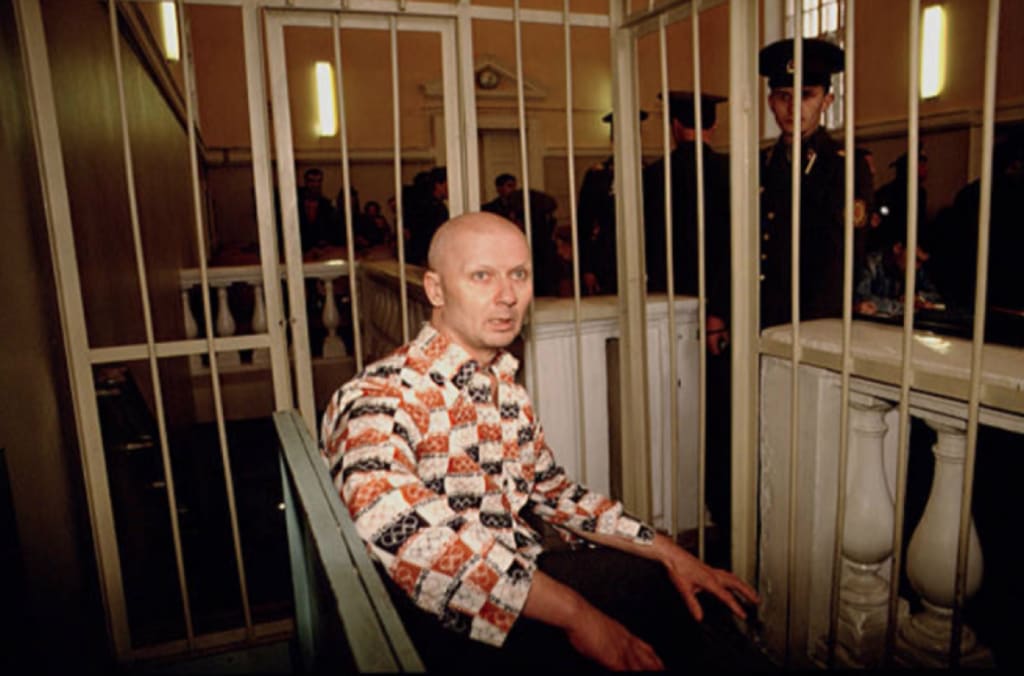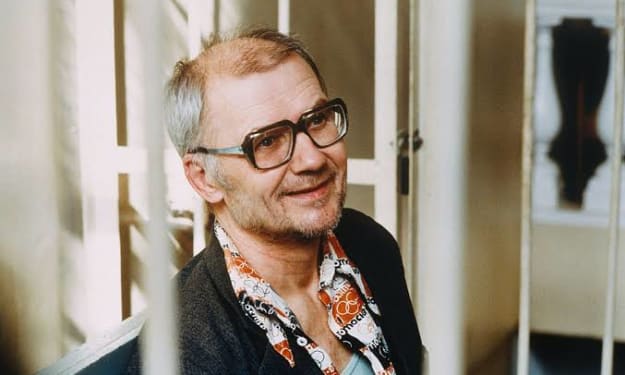The Rostov Predator: The True Face of Andrei Chikatilo(part3)
Unraveling the Criminal Mind of Andrei Chikatilo.

Confession
On 29 November, at the request of Burakov and Fetisov, Dr. Bukhanovsky was invited to assist in the questioning of the suspect. Bukhanovsky read extracts from his 65-page psychological profile to Chikatilo. Within two hours, Chikatilo burst into tears and confessed to Bukhanovsky that he was indeed guilty of the crimes for which he had been arrested. After conversing into the evening, Bukhanovsky reported to Burakov and Fetisov that Chikatilo was ready to confess.
Armed with the handwritten notes Bukhanovsky had prepared, Kostoyev prepared a formal accusation of murder dated 29 November—the eve of the expiration of the ten-day time period during which Chikatilo could legally be held before being charged. The following morning, Kostoyev resumed the interrogation. According to the official protocol, Chikatilo confessed to thirty-six of the thirty-eight murders police had linked to him, although he denied two additional murders committed in 1986 the police had initially believed he had committed. One of these victims was Lyubov Golovakha, found stabbed to death on 23 July 1986 and whom many investigators had had serious doubts about linking to the manhunt; the second was Irina Pogoryelova, found murdered in Bataysk on 18 August 1986 and whose mutilations closely matched those inflicted upon other victims linked to the manhunt.
Chikatilo gave a full, detailed description of each murder on the list of charges, all of which were consistent with known facts regarding each killing. When prompted, he could draw a rough sketch of various crime scenes, indicating the position of the victim's body and various landmarks in the vicinity of the crime scene. Additional details provided further proof of is hguilt: one victim on the list of charges was a 19-year-old student named Anna Lemesheva, whom Chikatilo had killed on 19 July 1984 near Shakhty station. Chikatilo recalled that as he had fought to overpower her, she had stated that a man named "Bars" ("Leopard") would retaliate for his attacking her. Lemesheva's fiancé had the nickname "Bars" tattooed on his hand.
In describing his victims, Chikatilo falsely referred to them as "déclassé elements" whom he would lure to secluded areas before killing. In many instances, particularly (though not exclusively) with his male victims, Chikatilo stated he would bind the victims' hands behind their back with a length of rope before he would proceed to kill them. He would typically inflict a multitude of knife wounds upon the victim; initially inflicting shallow knife wounds to the chest areabefore inflicting deeper stab and slash wounds—usually thirty to fifty in total—before proceeding to eviscerate the victim as he writhed atop his or her body until he achieved orgasm. Chikatilo had, he stated, become adept at avoiding the spurts of blood from his victims' bodies as he inflicted the knife wounds and eviscerations upon them, and would regularly sit or squat beside his victims until their hearts had stopped beating, adding that the victims' "cries, the blood and the agony gave me relaxation and a certain pleasure."
Chikatilo also informed Kostoyev he had often tasted the blood of his victims, to which he stated he "felt chills" and "shook all over". He also confessed to tearing at victims' genitalia, lips, nipples and tongues with his teeth. In several instances, Chikatilo would cut or bite off the tongue of his victim as he performed his eviscerations, then—either at or shortly after the point of death—run around the body as he held the tongue aloft in one hand. Although he also admitted that he had chewed upon the excised uterus of his female victims and the testicles of his male victims, he stated he had later discarded these body parts. Nonetheless, Chikatilo did confess to having swallowed the nipples and tongues of some of his victims.
On 30 November, Chikatilo was formally charged with each of the thirty-six murders he had confessed to, all of which had been committed between June 1982 and November 1990. Over the following days, Chikatilo confessed to a further twenty killings which had not been connected to the case, either because the murders had been committed outside the Rostov Oblast, because the bodies had not been found or, in the case of Yelena Zakotnova, because an innocent man had been convicted and executed for the murder., Chikatilo was able to provide details of these additional killings only the perpetrator could have known: one of these additional victims, 14-year-old Lyubov Volobuyeva, had lived in south-western Siberia, and had been killed in a sorghum field near Krasnodar Airport on 25 July 1982. Chikatilo recalled that he had killed Volobuyeva in a millet field and that he had approached the girl as she sat in the waiting rooms at Krasnodar Airport. Volobuyeva, Chikatilo stated, had informed him she lived in the Siberian city of Novokuznetsk, and was awaiting a connecting flight at the airport to visit relatives
Psychiatric evaluation
On 20 August 1991, after police had completed their interrogation, including re-enactments of all the murders at each crime scene, Chikatilo was transferred to the Serbsky Institute in Moscow to undergo a 60-day psychiatric evaluation to determine whether he was mentally competent to stand trial. Chikatilo was analysed by a senior psychiatrist, Andrei Tkachenko, who noted that Chikatilo had various physiological problems, which he attributed to prenatal brain damage. Examining Chikatilo's history, Tkachenko observed a "steady but gradual descent into perversion" which had been compounded by biological and environmental factors, with his increasingly extreme acts of homicidal violence ultimately committed to relieve internal tension. Tkachenko concluded on 18 October that although he suffered from a borderline personality disorder with sadistic features, he was fit to stand trial. In December 1991, details of Chikatilo's arrest and a brief summary of his crimes were released to the newly privatized Russian media by police.
Chikatilo was brought to trial in Rostov on 14 April 1992, charged with fifty-three counts of murder in addition to five charges of sexual assault against minors committed when he had been a teacher. He was tried in Courtroom Number 5 of the Rostov Provincial Court, before Judge Leonid Akubzhanov.
Trial and conviction
Chikatilo's trial was the first major media event of post-Soviet Russia. Shortly after his psychiatric evaluation at the Serbsky Institute, investigators had conducted a press conference in which a full list of Chikatilo's crimes was released to the press, alongside a 1984 identikit of the individual charged, but not the full name or a photograph of the accused. The media first saw Chikatilo on the first day of his trial, as he entered an iron cage specifically constructed in a corner of the courtroom to protect him from attack by the enraged and hysterical relatives of his victims. In the opening weeks of the trial, the Russian press regularly published exaggerated and often sensationalistic headlines about the murders, referring to Chikatilo being a "cannibal" or a "maniac" and to his physically resembling a shaven-skulled, demonic individual.
The first two days of the trial were devoted to Akubzhanov reading the long lists of indictments against Chikatilo. Each murder was discussed individually, and on several occasions, relatives present in the courtroom broke down in tears or fainted when details of their relatives' murder were revealed. After reading the indictment, Akubzhanov announced to the journalists present in the courtroom his intention to conduct an open trial, stating: "Let this trial at least teach us something, so that this will never happen anytime or anywhere again." Akubzhanov then asked Chikatilo to stand, identify himself and provide his date and location of birth. Chikatilo complied, although this would prove to be one of the few civil exchanges between the judge and Chikatilo.
In what became a regular (though not continuous) occurrence throughout the trial, Akubzhanov berated Chikatilo as he questioned him in detail as to the charges; ordering him to "shut your mouth", before adding, "You're not crazy!" as Chikatilo's responses to questions deviated into his discussing issues such as the repression his family had endured throughout his childhood, and his claiming that the charges filed against him were false. These verbal exchanges would occur whether Chikatilo was cooperative or uncooperative throughout proceedings, and the manner in which the judge questioned Chikatilo repeatedly led his defence lawyer Marat Khabibulin to protest against the accusatory nature of the court proceedings. In the instances in which Chikatilo was uncooperative throughout questioning, he would simply shout over the judge, denounce the court as a farce, and launch into rambling, disjointed speeches. On occasion, Chikatilo would also expose himself to the court or sing socialist movement anthems throughout proceedings. These antics regularly resulted in his being returned to his cell as court proceedings continued in his absence.
Chikatilo withdrew his confessions to six of the killings for which he had been charged on 13 May, and also claimed he had killed four further victims who were not included upon the indictment. The same day, Khabibulin again submitted a request that his client be subjected to a second psychiatric evaluation. This motion was dismissed by the judge as being groundless. In response, Khabibulin rose from his seat, condemning the composition of the court, and arguing that the judge was unfit to continue presiding over the case. Chikatilo himself repeated his earlier remarks as to the judge making numerous rash remarks prejudging his guilt. The prosecutor, Nikolai Gerasimenko, vocally supported the defence's claim, stating that the judge had indeed made too many such comments and had committed numerous procedural violations in his lecturing and insulting the defendant. Gerasimenko further contended that in his conducting an open trial, Chikatilo had already been effectively prejudged as being guilty by the press, before also requesting that the judge be replaced. Judge Akubzhanov would later rule that the prosecutor be replaced instead, briefly conducting the trial in the absence of a prosecutor until a replacement prosecutor, Anatoly Zadorozhny, could be found.
On 9 August, the defence delivered their closing arguments before the judge. Upon beginning his 90-minute closing argument, Khabibulin first stated he had no confidence his voice would be heard above the "general outcry" for retribution against Chikatilo, before questioning the reliability of the forensic evidence presented at the trial and describing areas of Chikatilo's confessions as being "baseless". He also questioned the judge's objectivity and harked back to the decision of the court not to allow the defence to present testimony from independent psychiatrists; emphasizing that crimes of this nature could not have been committed by an individual of sane mind. Khabibulin then formally requested the judge find his client not guilty.
The following day, prosecutor Anatoly Zadorozhny delivered his closing argument before the judge. Harking towards the earlier testimony of psychiatrists at the trial, Zadorozhny argued that Chikatilo fully understood the criminality of his actions, was able to resist his homicidal impulses, and had made numerous conscious efforts to avoid detection. Moreover, Zadorozhny emphasized that in 19 of the charges, the material evidence of the crimes had been provided by Chikatilo himself. Zadorozhny then recited each of the charges before formally requesting the death penalty.
Following the conclusion of the prosecutor's closing argument, Akubzhanov invited Chikatilo back into the courtroom before formally asking him whether he would like to make a final statement on his own behalf. In response, Chikatilo simply sat mute. Akubzhanov then announced an initial date of 15 September for himself and the two official jurors to review the evidence and pass the final sentence upon Chikatilo. (This date was later postponed until 14 October.) As court announced recess, the brother of Lyudmila Alekseyeva, a 17-year-old girl killed by Chikatilo in August 1984, threw a heavy chunk of metal at Chikatilo, hitting him in the chest. When security tried to arrest the young man, other victims' relatives shielded him.
On 14 October, the court reconvened to hear formal sentencing (this sentencing would not finish until the following day). Akubzhanov began sentencing by announcing Chikatilo guilty of fifty-two of the fifty-three murders for which he had been tried. He was sentenced to death for each offence. Chikatilo was also found guilty of five counts of sexual assault committed during the years he worked as a teacher in the 1970s. In reciting his findings, the judge read the list of murders again, before criticizing both the police and the prosecutor's department for various mistakes in the investigation which had allowed Chikatilo to remain free until 1990. Particular criticism was directed towards not local police, but the prosecutor's department—primarily procurator Issa Kostoyev—whom Akubzhanov scathed as "negligent", and who had been dismissive of Chikatilo's inclusion upon a 1987 suspect list compiled by police
Upon passing final sentence, Akubzhanov made the following remark:
Taking into consideration the horrible misdeeds of which he is guilty, this court has no alternative but to impose the only sentence that he deserves. I therefore sentence him to death.
Following the rejection of his appeal to the Supreme Court, Chikatilo filed a final appeal for clemency with President Boris Yeltsin. This final appeal was rejected on 4 January 1994.
On 14 February 1994, Chikatilo was taken from his death row cell to a soundproofed room in Novocherkassk prison and executed with a single gunshot behind the right ear. He was buried in an unmarked grave within the prison cemetery.
About the Creator
diego michel
I am a writer and I love writing






Comments
There are no comments for this story
Be the first to respond and start the conversation.